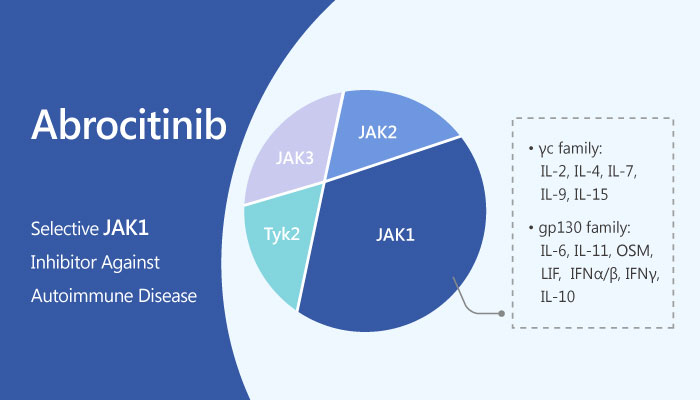Janus kinase (JAK) is a family of intracellular, nonreceptor tyrosine kinases. It transduces cytokine-mediated signals via the JAK-STAT pathway. Four members are in JAK family, they are JAK1, JAK2, JAK3, and TYK2. Specially, JAK1 is involved in many cytokines. Therefore, researchers expect to find out a selective JAK1 inhibitor, effective in inflammatory and immunological diseases. Additionally, Abrocitinib is a potent and selective JAK1 inhibitor, with potent anti-autoimmune disease activity.
In the beginning, Michael L. Vazquez, et al., synthesizes a series of analogues. They possess similar structure, and may have similar function. The researchers find out PF-04965842 (compound 25), the synonym of Abrocitinib is the most promising one.

Then, in the in vitro assay, Abrocitinib exhibits potent inhibitory effect on JAK1, with an IC 50 of 29 nM. Abrocitinib displays much more selectivity at JAK1 over JAK2, and TYK2 (IC50, 803 nM and 1.253 μM, respectively). Abrocitinib inhibits IFNα-stimulated phosphorylation of STAT3. It blocks IFN-stimulated phosphorylation of STAT1 in human whole blood (HWB). Abrocitinib also suppresses pSTAT5 in CD34+ spiked into HWB (JAK2). The IC50s are 189, 163 nM, 7.178 μM, respectively.
Subsequently, in the animal administration, Abrocitinib shows markedly anti-inflammatory activity. In the rat adjuvant-induced arthritis (AIA) disease model, Abrocitinib is dosed QD (once daily) at 5, 15, or 50 mg/kg via oral route. The inhibitor significantly reduces paw swelling. Abrocitinib is orally active, exhibits high bioavailability.
In summary, Abrocitinib is a potent, orally active and highly selective JAK1 inhibitor. It displays significant anti-autoimmune activity. Abrocitinib has become a candidate for the treatment of JAK1-mediated autoimmune diseases. But it still needs more study.
Reference:
J Med Chem. 2018 Feb 8;61(3):1130-1152.